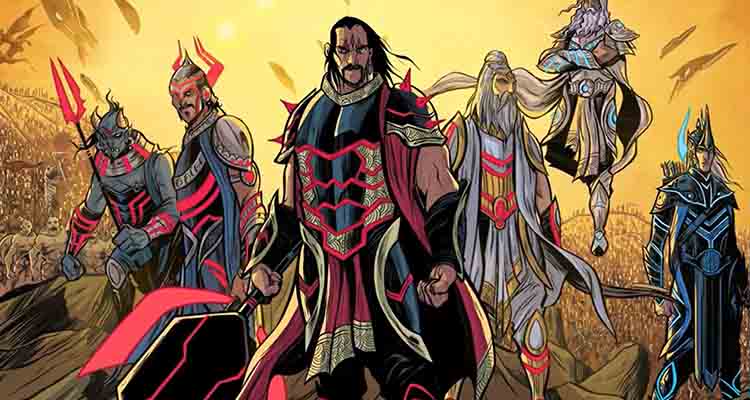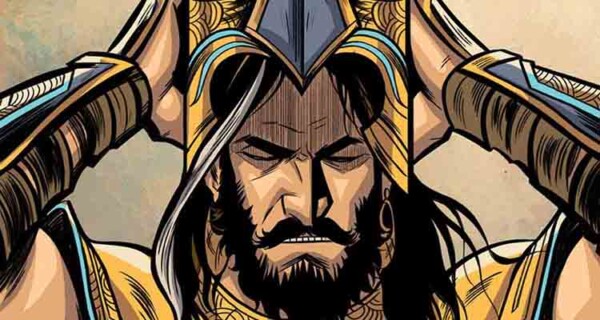Vikarna, a lesser-known character from the Mahabharat, was the dark horse of who never received enough credit. While you might have come across Duryodhana or Duhsasana representing the Kauravas often, Vikarna was the third Kaurava son hierarchically. An impeccable warrior, a skilled archer and loyal brother. He’s a character that deserves more recognition for his role in the epic of Mahabharat.
Who Is Vikarna?
Table of Contents
The third born of King Dhritarashtra and Gandhari, Vikarna holds a place of significance in the Mahabharata. Primarily, owing to the fundamental difference in his opinions and ideals from the rest of his brothers.
He might have been in the clan of the thirsty Kauravas, but to truly understand who is Vikarna and what his achievements were, one has to look beyond the nativity of his birth. A strong sense of ‘dharma’ and dutiful righteousness defined his character. That is what set him apart from the rest of his brothers.
The Kaurava brothers were greedy and ruthless in their ways of acquiring the kingdom.
During the famous dice game, when the brave Yudhishthir lost his equanimity and consequently his kingdom, Vikarna stood wary and concerned about the ongoing incidents. The Kauravas rejoiced watching their cousin Yudhishthir destroy himself and lose everything he owned.
But Vikarna could simply not be as thrilled as them. As the dice game continued, Yudhisthir lost everything to a point where he had to raise the stakes at his wife’s expense. When he had nothing more left to bet, he pawned off his wife Draupadi.
Related Reading: Birth of Legendary Veda Vyasa Through A One-Time Stand
This mercenary action deserved more backlash than it got. It was ironic for Yudhishtir to commit such an act since he has always been known for his principled approach and virtuous demeanor. This turn of events astonished almost everyone present in that court. However, a majority of them were unable to express their remorse for the ambience had gotten so heated already.
It was Vikarna who opposed the Draupadi cheer haran
When the sinful deed had occurred and the ill-fated Draupadi had been lost to the Kauravas, the poor princess was dragged into the central court of Hastinapur to be disrobed and utterly humiliated. As the Kaurava brothers began mistreating Draupadi, most other people in the court were unable to raise a voice and could only watch helplessly.
It was Vikarna who opposed the Draupadi cheer haran.
While everyone else stayed quiet and unmoved, Vikarna went against his brothers and tried to rescue Draupadi. Karna responded sharply to Vikarna’s concerns and insulted him for his stance. An honest and morally sound man, Vikarna asserted that Draupadi’s insult would doom the entire lineage and Kuru clan.
By saying this, not only was he trying to save his innocent sister-in-law from a horrific incident but was also displaying great perspicacity keeping the Kuru dynasty in mind. Unfortunately, his words were of no avail.
Related Reading: 12 Beautiful Facts Of Radha Krishna Relationship
Why did Vikarna fight for Kaurvas though he knew dharma?
Despite knowing the malicious character and ungodly intent of his brothers, Vikarna fought on the side of the Kauravas during the Kurukshetra war. Why did Vikarna fight for Kaurvas though he knew Dharma? Simply because his dharma did not allow him to stray from his path of being an obedient younger brother.
The ideals were so indelibly etched in his mind that he always prioritised his duties of being a true brother to Duryodhana.
Vikarna was aware of the correct path in life and knew that Duryodhana’s actions were only the complete opposite of them. But Vikarna, being of greater moral integrity, always stood by his elder brother and fulfilled his role dutifully. His dharma was to fight on the side of adharma – a paradox that plagued his soul.

Who killed Vikarna?
During the Kurukshetra war, it was Bheem who killed Vikarna. Having met his fate in the brutal war, it is noteworthy that he was nevertheless recognised for his righteous qualities, even by Bheem, his slayer. It was the fourteenth day of the bloody war and Arjuna had been plotting how to kill Jayadratha.
The Kauravas were aware of this and were formulating an effective defense to keep Jayadratha safe. Bheem was ordered to aid Arjuna against the Kaurava defense. Bheem’s unmatched strength was definitely a major hurdle for the Kauravas. That is when Duryodhana gave Vikarna the responsibility to oppose and face Bheem.
Related Reading: Bheeshma’s Oath: What Was The Real Reason Behind It?
How is Bheem’s killing of Vikarna justified?
A valiant and passionate Bheem had once previously vowed to kill the entirety of the Kaurava clan. That vow is how Bheem killing Vikarna is justified in the scriptures. In a sense, it was Bheem’s dharma to fulfil his vow and avenge the dishonor and treachery meted out to his wife and family by the Kauravas.
Even so, when he came face to face with Vikarna, his passion was dramatically subdued.
An agile Bheem’s force and fervor suddenly came to a halt when he confronted the reality that his conscience would not allow him to kill Vikarna. Like many others, Bheem too was aware of Vikarna’s inherent goodness and knew him to be an authentic follower of ‘dharma’.
Thus, he found it difficult to kill him. But just as it should happen, dharma prevailed. Vikarna reminded Bheem that he must not defy the orders given to hime and fight him for it is both their duties to simply to do so without a question. The two cousins had to engage in combat until Bheem prevailed and Vikarna attained martyrdom. It is said that after Bheem killed Vikarna, he lamented and grieved his death.

Vikarna – The Kumbhkarana of Dwapar Yug?
A parallel is often drawn between the character of Vikarna and that of the mighty Kumbhkarana from the Ramayan. Kumbhkarana is the famous and slightly comical brother of Ravana.
When Ravana revealed to Kumbhkarana that he had abducted Sita which had led Lord Rama to invade Lanka, he tried to make Ravana see the error of his ways.
He admitted that he believed Ravana was in the wrong. Ravana’s fury could not be allayed by such words and he went on to fight Lord Rama. Despite his disapproval of Ravana’s actions, Kumbhkarana fought by his brother’s side till his last breath.
This shows us that both Kumbhkarana and Vikarna were sensitive to the women around them. Both the men understood the wrongfulness of female oppression. They both felt strongly and opposed the wrongful acts around them. But eventually succumbed to their duties of being loyal brothers.
Your contribution does not constitute a charitable donation. It will allow Bonobology to continue bringing you new and up-to-date information in our pursuit of helping anyone in the world to learn how to do anything.





















